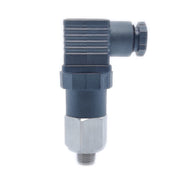Pressure sensors are used to measure pressure in a variety of industries, including automotive, aerospace, medical, and industrial applications. The price of a pressure sensor can vary significantly depending on several factors, including the type of sensor, its accuracy, and its intended application. In this article, we will explore the factors that affect the price of a pressure sensor.
- Type of Sensor
The type of pressure sensor is one of the most significant factors that affect its price. There are several types of pressure sensors available on the market, including piezoelectric, capacitive, and strain gauge sensors. Each type of sensor has different features, which can affect its cost. Piezoelectric sensors, for example, are often more expensive than other types of sensors due to their high sensitivity and accuracy.
- Accuracy
The accuracy of a pressure sensor is another factor that affects its price. High accuracy sensors can be more expensive due to the technology required to achieve this level of precision. For example, a pressure sensor that can measure pressure to within 0.1% accuracy will be more expensive than a sensor that can only measure pressure to within 1% accuracy.
- Pressure Range
The pressure range of a sensor can also affect its price. Sensors that can measure a wide range of pressures, from vacuum to high pressures, may be more expensive than sensors that can only measure a narrow range of pressures.
- Materials
The materials used to make a pressure sensor can also affect its price. Sensors made from high-quality materials, such as stainless steel or titanium, will be more expensive than sensors made from lower-quality materials.
- Intended Application
The intended application of a pressure sensor can also affect its price. For example, sensors used in harsh environments, such as those exposed to extreme temperatures, chemicals, or vibration, may require additional protection or specialized features that can drive up the cost.
- Brand
The brand of the pressure sensor can also affect its price. Well-known and established brands may charge a premium for their products due to their reputation and perceived quality.
- Quantity
Finally, the quantity of pressure sensors purchased can also affect the price. Bulk orders can often be discounted, while single orders may be more expensive.
In conclusion, the price of a pressure sensor can vary significantly depending on several factors, including the type of sensor, its accuracy, pressure range, materials, intended application, brand, and quantity. It's important to consider these factors when selecting a pressure sensor to ensure that it meets the necessary requirements of the specific application, while also staying within budget constraints.



Leave a comment